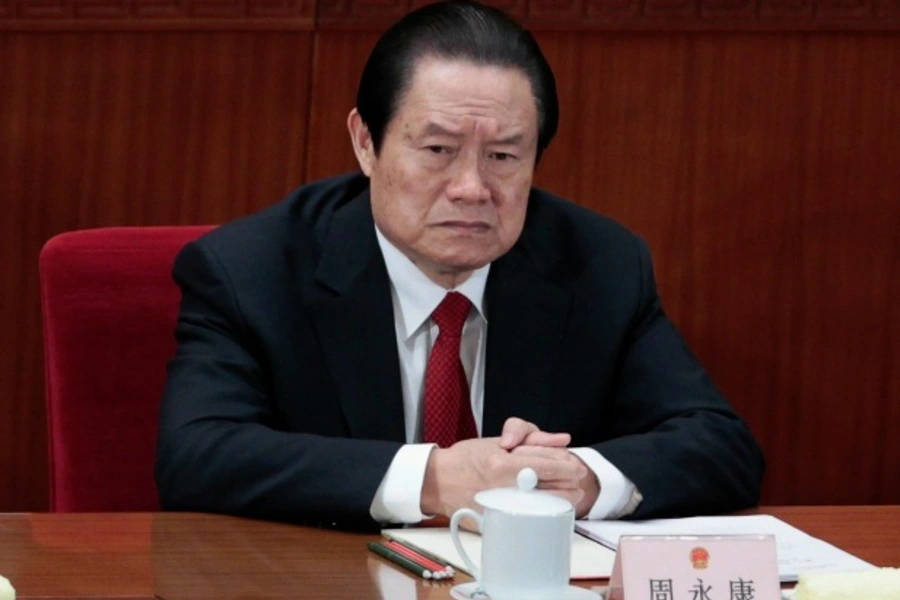Friday Asia Update: The Top Five Stories for the Week of December 5, 2014

More on:
Ashlyn Anderson, Lauren Dickey, Darcie Draudt, Andrew Hill, Will Piekos, and Sharone Tobias look at the top stories in Asia today.
1. Zhou Yongkang arrested. Former head of China’s domestic security Zhou Yongkang was expelled from the Communist Party and arrested earlier today on charges including accepting bribes, helping family members and associates access government assets, disclosing state secrets, and leaking official secrets, Chinese state news service Xinhua announced. The decision was made by the Communist Party Politburo, comprised of the twenty-five most powerful officials in China, meaning that it is very likely that Zhou will be convicted. Zhou held a seat on the Politburo Standing Committee, the country’s top decision-making body, until Chinese President Xi Jinping came to power in November 2012. The party has been formally investigating Zhou for corruption since July as part of Xi’s promise to tackle high-level corruption in China. A New York Times investigation earlier this year documented that several of Zhou’s relatives held assets worth about 1 billion yuan, or $160 million. Zhou has not been seen in public for more than a year.
2. Opposition party wins big in Taiwan local elections. Taiwan held elections for nine categories of elected office last Saturday. With a total of 11,130 seats up for grabs, the opposition Democratic Progressive Party (DPP) trounced the incumbent Kuomintang (KMT), in what has since been deemed “black Saturday” for the KMT. The Taipei mayoral vacancy, one of the island’s most coveted political seats, went to Mr. Ko Wen-je, an independent who’s political views generally align with the DPP, which advocates an independent Taiwan. Premier Jiang Yi-huah resigned after the heavy losses, and President Ma Ying-jeou stepped down as chairman of the KMT party. Taiwan’s new Premier, Mao Chi-kuo, has since unveiled his new cabinet, reappointing most members to their previous roles. The impact of Taiwan’s local elections, and its utility as a barometer for the remaining Ma years, suggest that Beijing would benefit from learning to work with the DPP.
3. Sony hacked; North Korea suspected. Sony Pictures suffered a major cyberattack late November that rendered many of its computer unusable and resulted in leaked information, including employees’ personal information and full-length movies. Some experts believe that North Korea is responsible in part because it has tried to stop Sony from releasing “The Interview,” a film about two American journalists who are recruited by the CIA to assassinate North Korea leader Kim Jong-Un. An unnamed U.S. national security official said that North Korea is the primary suspect, though Pyongyang has denied any involvement, and other experts believe that the attack does not fit North Korea’s usual pattern of cyberattack. The film, starring James Franco and Seth Rogen, will still be released on schedule, even though Pyongyang has called it “an act of war.”
4. Hong Kong democracy protestors weigh options. With public support for street protests flagging and government forces encroaching on the remaining camps, protests leaders are divided over how to proceed with their pro-democracy demonstrations. Violent clashes occurred in Mong Kok last week during and after a police takeover of the area, and over the weekend protestors attempted to blockade the city’s legislative offices in Admiralty, resulting in dozen of arrests. With seemingly little hope of government concession, the three leaders of Occupy Central, a more tempered faction of the protest movement, surrendered themselves to police; they were soon released with no charges. Student protestors, however, are as yet undecided on how to proceed—some have suggested that it is time to retreat from the streets, while others are still hopeful that they can convince the Hong Kong government to negotiate. Joshua Wong, the leader of Scholarism, one of two main student protest groups, along several other students, began a hunger strike on Monday, swearing to continue until he is granted an audience with Leung Chun-ying, Hong Kong’s chief executive.
5. Indian “superbugs” lead to increased infant mortality. Indian infants born with antibiotic-resistant bacterial infections are on the rise; more than 58,000 cases were reported last year. Nearly one-third of all newborn deaths occur in India (800,000 every year), and these “superbugs” will lead to more higher mortality rates. Pediatricians in India report that such cases were nearly non-existent five years ago. The superbugs’ genetic code have since been found in cases around the world, including France, Japan, Oman, and the United States.
Bonus: China gets punitive on puns. China’s policies seem begging for puns in the United States, but China’s media regulators have banned puns and “irregular wordplay” from television and advertising. The regulator’s website claims the puns could lead to “cultural and linguistic chaos,” by misleading young audiences in a way that is contradictory to traditional Chinese culture. Ease of communication via the Internet has led to a proliferation of perversions of traditional four-character idioms. No word yet on what the pun-ishments for offenders might be.
More on:
 Online Store
Online Store